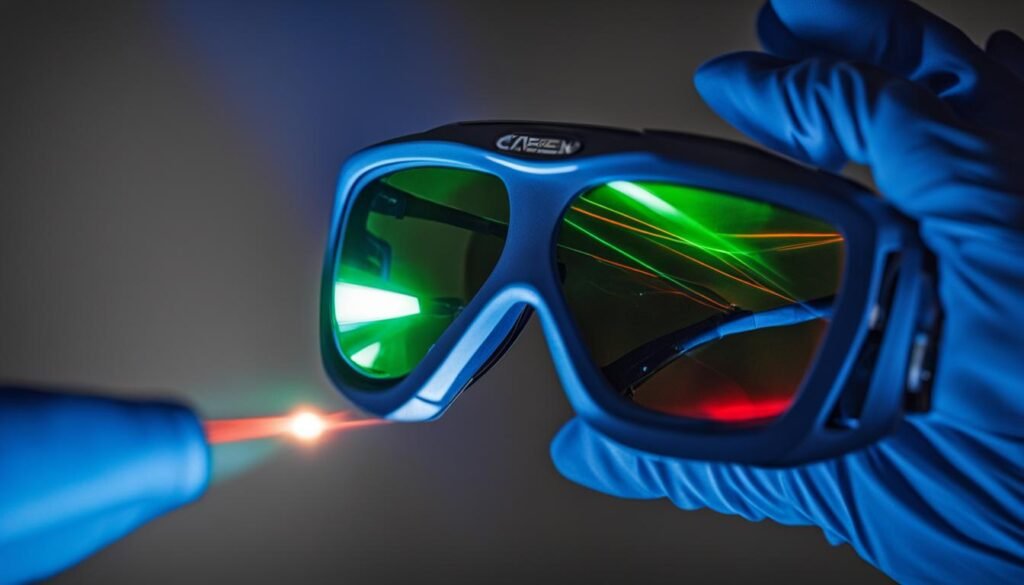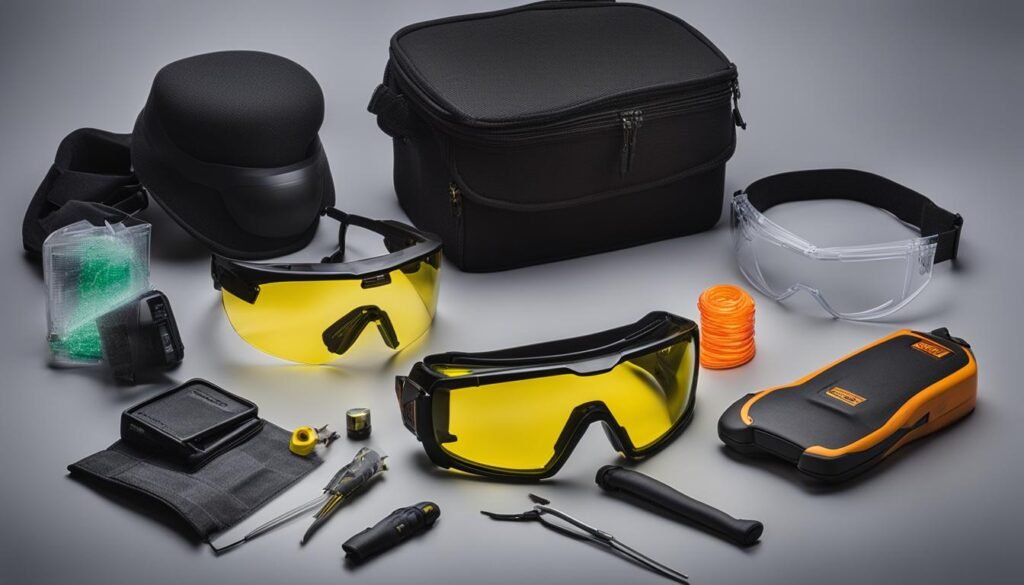If you work with lasers, it is crucial to wear the appropriate safety gear to protect your eyes from permanent damage. Not all safety glasses are created equal, as different lasers emit light at various wavelengths and intensities. To ensure your laser safety glasses provide adequate protection, you need to evaluate factors such as wavelength range, optical density, and material composition.
Contents
- 1 Choosing the Right Laser Safety Glasses
- 2 Understanding Different Laser Types
- 3 Factors to Consider When Shopping for Laser Glasses
- 4 Expert Advice on Laser Safety Glasses
- 5 The Importance of Proper Care and Maintenance
- 6 Contacting Laser Safety Experts
- 7 Conclusion
- 8 FAQ
- 8.1 Why is it important to wear laser safety glasses?
- 8.2 How do I choose the right laser safety glasses?
- 8.3 Do I need different laser safety glasses for different types of lasers?
- 8.4 What factors should I consider when shopping for laser glasses?
- 8.5 How can laser safety experts help me in choosing the right glasses?
- 8.6 How should I care for and maintain my laser safety glasses?
- 8.7 Where can I find laser safety experts and high-quality laser safety glasses?
- 9 Source Links
Key Takeaways:
- Proper laser safety gear is essential when working with lasers to protect your eyes.
- Not all safety glasses are suitable for all laser types, so it is important to choose the right glasses.
- Evaluating factors such as wavelength range and optical density is crucial when selecting laser safety glasses.
- Consulting with a Laser Safety Officer (LSO) can help ensure you choose the right glasses for your specific needs.
- Care and maintenance of laser safety glasses are vital for their longevity and continued effectiveness.
Choosing the Right Laser Safety Glasses
When working with lasers, it is crucial to prioritize your safety by wearing appropriate laser safety glasses. These glasses are specifically designed to protect your eyes from the harmful effects of laser radiation. However, not all laser safety glasses are the same, and it is important to choose the right ones that provide adequate protection for your specific laser application.
When selecting laser safety glasses, there are several factors you need to consider. First, you should evaluate the wavelength range of your laser and ensure that the glasses you choose are designed to protect against that specific wavelength. Different lasers emit light at various wavelengths, and wearing the wrong glasses can leave your eyes vulnerable to damage.
Another important factor to consider is the optical density (OD) rating of the glasses. The OD rating indicates the level of protection provided by the glasses. Higher OD ratings offer greater protection against laser radiation. It is recommended to consult with your Laser Safety Officer (LSO) for guidance on the appropriate OD rating for your laser application.
By carefully evaluating the wavelength range and optical density requirements of your laser, you can choose the right laser safety glasses that provide the necessary protection for your eyes. Remember to consult with experts and follow the recommended guidelines to ensure your safety while working with lasers.
Evaluating Laser Glasses Guidelines
| Factor | Importance |
|---|---|
| Wavelength Range | Crucial |
| Optical Density (OD) | Important |
| Laser Safety Officer (LSO) Consultation | Recommended |
Understanding Different Laser Types
When it comes to laser safety, it is important to understand the different types of lasers and the specific precautions and safety measures required for each type. Laser safety guidelines and standards have been established to ensure the protection of individuals working with lasers. By familiarizing yourself with these guidelines and understanding the characteristics of different laser types, you can make informed decisions regarding laser safety glasses and protective measures.
Table 1: Laser Types and Safety Requirements
| Laser Type | Wavelength | Required Safety Measures |
|---|---|---|
| Visible Lasers (e.g., Red, Green) | 400 – 700 nm | No specific requirements, but protective eyewear is recommended. |
| Ultraviolet (UV) Lasers | <400 nm | Provide protection against UV radiation, as UV lasers can cause serious eye damage. |
| Infrared (IR) Lasers | >700 nm | Use laser safety glasses that provide adequate protection against IR radiation. |
| High-Power Lasers | Varies | Additional safety measures may be required, such as laser interlock systems and controlled access areas. |
By understanding the different laser types and their corresponding safety requirements, you can ensure that you select the appropriate laser safety glasses that provide the necessary protection against the specific wavelengths and intensities associated with your laser.
Additionally, it is important to regularly review and adhere to laser safety guidelines and standards to maintain a safe working environment for yourself and others. Laser safety is a critical aspect of working with lasers, and by staying informed and implementing the necessary safety measures, you can protect your eyes from potential harm.
Factors to Consider When Shopping for Laser Glasses
When shopping for laser glasses, there are several factors to consider to ensure you choose the right ones that provide the necessary protection for your eyes. Whether you are working in a laboratory or an industrial setting, these considerations will help you make an informed decision:
- Wavelength Range: Different lasers emit light at various wavelengths. It is crucial to select laser glasses that are designed to protect against the specific wavelength(s) of your laser. Consult the laser specifications or seek expert advice to determine the appropriate wavelength range for the glasses.
- Optical Density: Laser glasses come with an optical density (OD) rating that indicates the level of protection they offer. Higher OD ratings provide greater protection against laser radiation. Ensure that the glasses you choose have an appropriate OD rating for your laser’s intensity.
- Material Composition: Laser safety glasses are typically made of polycarbonate or glass. Polycarbonate glasses are lightweight and shatter-resistant, making them suitable for environments where impact resistance is crucial. Glass glasses offer superior optical clarity and scratch resistance. Consider your specific needs and the working conditions when deciding between the two materials.
- Frame Style and Comfort: Consider the frame style and comfort features of the laser glasses. Some glasses are designed to fit over prescription eyewear, while others offer adjustable nose pads and temples for a customized fit. Opt for glasses that are comfortable to wear for extended periods to ensure compliance with safety protocols.
By carefully considering these factors, you can make an informed decision when shopping for laser glasses and ensure the safety of your eyes in laser environments.
“Select laser glasses that are designed to protect against the specific wavelength(s) of your laser.”
Expert Advice on Laser Safety Glasses
If you are unsure about which laser safety glasses to choose, it is always a good idea to consult with your Laser Safety Officer (LSO) or seek expert advice. Their expertise can help guide you in selecting the right glasses based on your specific needs and requirements. Laser safety certification and training can also provide valuable insights into the importance of choosing the correct glasses and using them properly.
Expert advice can help you navigate the various factors involved in selecting laser safety glasses. They can assess the specific wavelength range and optical density required for your laser, ensuring that the glasses you choose are suitable for the job. By consulting with experts, you can also gain valuable knowledge about the different types of lasers and the specific protection they require.
Laser safety experts are well-versed in the latest guidelines and standards, ensuring that the glasses you select meet the necessary safety requirements. They can provide personalized recommendations based on your laser application and offer insights into the best practices for laser safety. Seeking expert advice can give you peace of mind, knowing that you have made informed decisions to protect your eyes from potential harm.
Consulting with your Laser Safety Officer (LSO) or seeking expert advice is crucial to select the right laser safety glasses that meet the required safety standards and protect your eyes.
The Importance of Laser Safety Certification and Training
In addition to seeking expert advice, laser safety certification and training can play a vital role in ensuring your understanding of laser safety protocols. By undergoing proper training, you can learn about the potential hazards associated with lasers and the importance of using the appropriate safety equipment.
Laser safety certification courses cover topics such as laser classification, safety measures, and the proper use of laser safety glasses. They also provide practical knowledge on handling lasers safely in different environments. Training programs not only equip you with the necessary knowledge but also help you stay up-to-date with the latest industry standards and best practices.
The Importance of Proper Care and Maintenance

Proper care and maintenance of laser safety glasses are essential for prolonging their lifespan and ensuring they continue to provide optimal protection. By following recommended care practices and taking necessary precautions, you can safeguard both yourself and your investment in laser safety equipment.
When it comes to caring for your laser safety glasses, regular cleaning is key. Use a soft, lint-free cloth to gently wipe away any dirt or debris from the lenses. Avoid using harsh chemicals or abrasive materials that could scratch the lens surface. Additionally, never leave your glasses exposed to extreme heat or direct sunlight, as this can degrade their effectiveness over time.
“Regularly checking the glasses for any damage and replacing them if necessary is also important for your safety.”
Storing your laser safety glasses properly is equally important. Keep them in a protective case when they are not in use to prevent accidental damage. If you wear prescription eyewear, consider investing in over-glasses protectors or specially-designed laser safety glasses that can be worn over your everyday glasses. This ensures that you can maintain clear vision while still protecting your eyes from laser radiation.
| Care Tips for Laser Safety Glasses | Do | Don’t |
|---|---|---|
| Cleaning | Use a soft, lint-free cloth | Use harsh chemicals or abrasive materials |
| Storage | Keep in a protective case when not in use | Leave exposed to extreme heat or direct sunlight |
| Over-glasses Protectors | Invest in over-glasses protectors if wearing prescription eyewear | Assume regular eyewear provides sufficient protection |
Regularly checking the glasses for any damage and replacing them if necessary is also important for your safety. Over time, laser safety glasses can become scratched or damaged, reducing their protective capabilities. If you notice any signs of wear or damage, it is vital to replace them promptly to ensure ongoing eye protection.
By prioritizing the care and maintenance of your laser safety glasses, you can prolong their lifespan and ensure they consistently provide the level of protection you need. Remember to clean your glasses regularly, store them properly, and check for any signs of damage. By taking these simple steps, you can protect your eyes and maintain a safe working environment.
Contacting Laser Safety Experts

If you find yourself in need of expert advice when it comes to laser safety equipment, don’t hesitate to reach out to laser safety experts. These specialists possess in-depth knowledge and experience in the field, allowing them to provide valuable guidance and recommendations tailored to your specific needs.
When contacting laser safety experts, you can expect personalized assistance in selecting the right laser safety glasses for your laser application. They will take into consideration factors such as wavelength range, optical density, and material composition, ensuring that you have the necessary protection to safeguard your eyes.
At Phillips Safety, we have a team of laser safety experts ready to assist you. With their expertise and our wide range of laser safety glasses and accessories, you can trust that you’ll receive the expert advice and high-quality equipment you need for optimal eye protection. Contact our team today to discuss your laser safety requirements and find the right solutions for you.
Testimonial from a Satisfied Customer:
“The laser safety experts at Phillips Safety really know their stuff. They patiently answered all my questions and helped me choose the perfect laser safety glasses for my research project. I highly recommend their services to anyone in need of laser eye protection.”
– Jessica D.
Conclusion
Protecting your eyes is of utmost importance when working with lasers. By adhering to laser safety guidelines, selecting suitable laser safety glasses, and seeking expert advice when necessary, you can ensure the well-being of your eyes while working with lasers.
Remember to prioritize laser safety in your work environment by consulting with your Laser Safety Officer (LSO) and following their recommendations. Your LSO can provide valuable insights on the appropriate safety measures and equipment required for your specific laser application.
Additionally, proper care and maintenance of your laser safety glasses are essential for their longevity and continued effectiveness. Regularly inspect your glasses for any signs of damage and replace them as needed to maintain optimal protection.
By prioritizing laser safety, following the necessary precautions, and staying informed about the latest guidelines, you can protect your eyes and create a safe working environment when working with lasers.
FAQ
Why is it important to wear laser safety glasses?
Laser safety glasses are crucial for protecting your eyes from permanent damage when working with lasers.
How do I choose the right laser safety glasses?
When selecting laser safety glasses, consider factors such as wavelength range, optical density, and consult with your Laser Safety Officer (LSO).
Do I need different laser safety glasses for different types of lasers?
Yes, different types of lasers may require different laser safety glasses as they emit light at various wavelengths.
What factors should I consider when shopping for laser glasses?
Factors to consider include frame style, lens color, comfort, and material composition (polycarbonate or glass).
How can laser safety experts help me in choosing the right glasses?
Laser safety experts can provide personalized recommendations based on your laser application and ensure that you have the necessary protection.
How should I care for and maintain my laser safety glasses?
Proper care includes following recommended cleaning practices, storing the glasses appropriately, and regularly checking for any damage.
Where can I find laser safety experts and high-quality laser safety glasses?
Phillips Safety offers a wide range of laser safety glasses and accessories, and their experts are available to provide guidance and answer any questions you may have.



